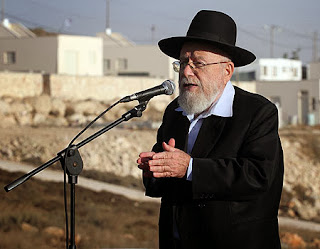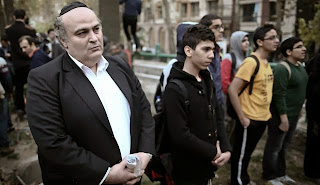The Jewish State Loses its Attraction for Jews
It is somewhat ironic that Israel – founded as a ‘Jewish; state –has more Jews leaving it than entering it, despite it being a social taboo.
![]() |
| Amos Elon - author of ' Founders & Sons' emigrated to Tuscany, Italy |
Why is this so? Because even most Israelis see through the propaganda that says that ‘anti-Semitism’ is growing in Europe. Because of the racist and intolerant society and atmosphere in Israel. Because far-right nationalists and Orthodox Jews have taken over the government led by Netanyahu and because the most dangerous place to be in the world is Israel!
The murder of 3,000 Argentinian Jews during the Junta, when Israel blocked visas for Jewish leftists whilst carrying on a profitable trade with the regime, has blown out of the water the idea that Israel is a refuge. To many intellectual Israelis like Amos Elon, whose final days were spent in Tuscany, Italy, Israel has nothing to offer than a racist state obsessed with ‘who is a Jew’ and the demographic terror of waking up to ‘too many’ Arabs.
![]() |
| Israeli protests over standard of living |
Below are
3 articles on a subject that Zionists rarely discuss.
Tony Greenstein
Doug Saunders, Vienna — The Globe and Mail
Saturday, Nov. 16 2013
Have you heard about Europe’s Jewish exodus? Amid growing tensions and tough economic conditions, tens of thousands of educated middle-class Jews are fleeing every year – not out of the continent, but rather from Israel into Europe, and especially to Germany, which has become the chief destination (after the United States) for the half-million Israelis who have left the country amid its much-discussed “brain drain.”
![]() |
| Egyptian write Ahdaf Soueif speaking to Israeli apartheid week in Gaza |
This has taken both Israelis and many Europeans by surprise – and offended some Israeli leaders. Last month, Foreign Minister Yair Lapid, during a visit to Budapest, took to Facebook to denounce the growing wave of Europe-bound Jews who have become known in the Israeli media as the New Yordim (emigrants, or literally, “fallen”).
“A word to all those who are fed up, and are leaving for Europe,” he wrote, then described his family’s tragic history in the Holocaust, concluding:
“Forgive me if I’m a little impatient with those who are willing to throw away the only country the Jews have because it’s easier to live in Berlin.”Easier to live in Berlin? That would not, even a generation ago, have been a common Jewish sentiment. Among North American Jews, even visiting Germany on vacation remains a matter of controversy and distaste. The black years of the Shoah are too fresh in many family histories.
Yet for this generation of Israelis, the shift to Europe is surprisingly uncontroversial. Last year, I had a conversation with a successful Israeli historian who had taken up residency in Germany. “
That move must have shocked a lot of your friends in Israel,” I suggested. She looked askance, as if this was an unheard-of notion: “
No, of course not,” she said. “
My friends are all just jealous that I can get a visa to live here. Every Israeli academic of my generation wants to move to Europe.”Much of this emigration has to do with Israel’s impossible economic conditions – writer Ruth Margalit recently
noted that 87 per cent of Israelis over 25 are financially dependent on their parents.
But it is also political: European countries are seen by Israelis as stable, egalitarian and safe, while in an Israel governed by hard-line regimes, the zealots and the Orthodox seem destined to prevail. “
With all due respect,” Jerusalem Post columnist Susan Hatis Rolef recently wrote, “
I think it is physically safer for a Jew to live in Berlin these days than in Jerusalem, though I do not belittle the emotional difficulty involved for a Jew to do so, given the not-too-distant history.”She listed the reasons for the exodus: “
loss of hope that peace will ever prevail … discomfort with the lack of determination of Israel’s leaders to make a serious effort to separate religion and state … and the feeling that life in Israel frequently feels like life in a pressure cooker.”Still, it might seem more logical that the Jewish exodus would be out of Europe, not into it. Here in Austria, a party with an anti-Semitic and neo-Nazi background won nearly a fifth of the vote in the Sept. 29 elections. In Hungary, France, Greece and the Netherlands, parties based on religious and racial intolerance have had strong showings (although they govern nowhere). In a recent survey, 76 per cent of European Jews said they believe anti-Semitism has increased over the past five years. In France, home to half of Europe’s Jews, almost half said they had considered emigrating out of Europe.
So which is it: a Europe safe for Jews disenchanted by Israel, or a Europe Jews are seeking to flee? It’s important to understand that there are really two Europes.
The most comprehensive recent study of cross-European attitudes toward religious minorities was conducted two years ago by Andreas Zick of the Institute for Interdisciplinary Resarch on Conflict and Violence. It found a huge divergence in attitudes.
On the statement “
Jews have too much influence in my country,” a staggering 69 per cent of Hungarians and 50 per cent of Poles answered yes, compared to far smaller numbers in Western Europe (14 per cent in France, 20 per cent in Germany and 6 per cent in the Netherlands) Likewise, majorities in Poland, Hungary and Portugal agreed with the statement
“Jews in general do not care about anything or anyone but their own kind,” while this was a small minority view in the larger economies.
In Europe’s centre and east, where hardly any Jews remain to be found, public intolerance has risen to dangerous proportions. In the larger economies, Jews are largely seen as fellow citizens with a different religion. Unfortunately, the places where people of any religious minority are free from annoying zealotry are becoming fewer in number.
Why Are So Many Jews Leaving Israel?
by URI AVNERY
THOSE WHO are interested in the history of the Crusades ask themselves: what brought about the Crusaders’ downfall? Looking at the remnants of their proud fortresses all over the country, we wonder.
The traditional answer is: their defeat in the battle of the Horns of Hattin, twin hills near the Lake of Galilee, in 1187, by the great Muslim Sultan Salah ad-Din (Saladin).
However, the Crusader state lived on in Palestine and the surroundings for another hundred years.
The most authoritative historian of the Crusades, the late Steven Runciman, gave a completely different answer: the Crusader kingdom collapsed because too many Crusaders returned to their ancestral homelands, while too few came to join the Crusaders. In the end, the last remnants were thrown into the sea (literally).
THERE ARE vast differences between the Crusader state that existed in this country for two hundred years and the present State of Israel, but there are also some striking similarities. That’s why their history always attracted me.
Lately I was reminded of Runciman’s conclusion because of the sudden interest of our media in the phenomenon of emigration. Some comments bordered on hysteria.
The reasons for this are two. First, a TV network reported on Israeli descenders abroad, second, the award of the Nobel chemistry prize to two ex-Israelis. Both caused much hand-wringing.
“Descenders” (Yordim) is the Hebrew term for emigrants. People coming to live in Israel are called
“ascenders” (Olim), a term akin to pilgrims. Probably the word has something to do with the fact that Jerusalem is located on a hill surrounded on all sides by valleys, so that you have to “go up” to reach it. But of course there is an ideological Zionist connotation to the terms.
Before the founding of our state and during its first few decades, we saw ourselves as a heroic society, struggling against great odds, fighting several wars. People leaving us were looked upon as deserters, like soldiers running away from their unit during a battle. Yitzhak Rabin called them ‘trash”.
What made the TV story so frightening was that it showed ordinary middle-class young Israeli families settling for good in Berlin, London and New Jersey. Some of their children were already speaking foreign languages, abandoning Hebrew. Terrible.
Until lately, “descending” was mostly attributed to misfits, lower-class people and others who could not find their place in ordinary society. But here were normal, well-educated young couples, Israeli-born, speaking good Hebrew. Their general complaint – sounding rather like an apology – was that they could not “end the month” in Israel, that their middle-class salaries did not suffice for a decent living, because salaries are too low and prices too high. They singled out the prices of apartments. The price of an apartment in Tel Aviv is equivalent to 120 months’ average middle class income.
However, sober research showed that emigration has actually decreased during the last few years. Polls show that the majority of Israelis, including even a majority of Arab citizens, are satisfied with their economic situation – more than in most European nations.
THE SECOND reason for hysteria was the award of the Nobel Prize to two American Chemistry professors who were educated in Israel, one of them born in a Kibbutz.
Israel is immensely proud of its Nobel laureates. Relative to the size of the country, their number is indeed extraordinary.
Many Jews are deeply convinced that the Jewish intellect is superior to that of any other people. Theories about this abound. One of them is that in medieval times, European intellectuals were mostly celibate monks who did not bequeath their genes to any offspring. In Jewish communities, the opposite happened: the rich were proud to marry their daughters to especially gifted Torah scholars, allowing their genes to start life in privileged circumstances.
Yet here were these two scholars who left Israel decades ago to graze in foreign meadows, continuing their research in prestigious American universities.
In former years, they would have been called traitors. Now they only cause profound soul-searching. One of the two had left Israel because the highly-regarded Weizmann Institute did not offer him a professorship. Why did we let him go? What about all the others?
Actually, this is not a specifically Israeli problem. Brain-flight is taking place all over the world. An ambitious scientist longs for the best of laboratories, the most prestigious university. Young minds from all over the world flock to the US. Israelis are no exception.
We have good universities. Three of them figure somewhere on the list of the world’s hundred best. But who can resist the temptations of Harvard or MIT?
THE SUDDEN disillusion caused Israelis to take a hard look at Israeli academia. It appears that our standards are slipping all along the line. Our universities are under-funded by the government, the number of professors and their quality decreasing. High-school students are slipping in their exams.
Why?
Immense funds are swallowed by the army, whose demands grow from year to year, though our security situation is improving all the time.
Our eternal occupation of the Palestinian territories is a drain on our meager resources. So are the settlements, of course. Our government invests in them huge sums of money. The exact amounts are a state secret.
In the long run, a small country with limited resources cannot sustain a huge army, as well as an occupation regime and hundreds of settlements, without depriving everything else. One single fighter plane costs more than a school or a hospital or a laboratory.
BUT MY worry about emigration is not limited to material considerations.
People do not leave for material reasons only. They may think that they are emigrating because life in Berlin is cheaper than in Tel Aviv, apartments easier to find, salaries higher. But it is not only the strength of the attraction of foreign lands that counts – it is also the strength or weakness of the bond to the homeland.
In the years when “descenders” were considered trash, we were proud of being Israeli. During the fifties and sixties, whenever I presented my Israeli passport at any border control, I felt good. Israel was viewed with admiration throughout the world, not least by our enemies.
I believe that it is a basic human right to be proud of one’s society, one’s country. People belong to nations. Even in today’s global village, most people need the sense of belonging to a certain place, a certain people. No one wants to be ashamed of them.
Today, when presenting his passport, an Israeli feels no such pride. He may feel a sense of contrariness (“us against the whole world”), but he or she is conscious of his country being considered by many as an apartheid state, oppressing another people. Every person abroad has seen countless photos of heavily armed Israel soldiers confronting Palestinian women and children.
Nothing to be proud of.
This is not a subject anyone ever speaks of. But it is there. And it is bound to get worse.
Jewish Israelis are already a minority in the country ruled by Israel, from the Mediterranean to the Jordan. The majority of subjects deprived of all rights is growing by the year. Oppression will necessarily grow. The image of Israel throughout the world will get worse. Pride in Israel will fade.
ONE EFFECT is already becoming obvious.
A prestigious recent poll conducted among American Jews shows a marked loosening of the attachment young Jews there feel for Israel.
The American Jewish scene is dominated by elderly professional leaders who were never elected by anyone. They exert immense power over American political life, but their influence in their own community is slipping. Young Jewish Americans are no longer proud of Israel. Some of them are ashamed.
These young Jews do not, in general, stand up to protest. They are afraid of providing ammunition to the anti-Semites. They are also educated from childhood that we Jews must stand together against the Goyim who want to destroy us.
So, instead of raising their voice, they keep quiet, leave their communities, disappear from sight. But this process can be utterly disastrous for Israel, Our leaders rely completely on the stranglehold they have on American politicians. If these perceive that the Jewish support of Israel is diminishing, they will be quick to liberate themselves.
THERE IS another aspect to the Zionist part of the equation.
Zionism is supposed to bring Jews to Israel. That is what it is all about. But Zionism can be a two-way street.
Israel declares itself to be “the State of the Jewish People”. Jews all over the world are considered de facto Israeli nationals. But if there is no basic difference between a Jew in Haifa and a Jew in Hamburg, why stay in Haifa when life in Hamburg seems to be so much better?
I have campaigned for decades to exchange Zionist theology for a simple Israeli patriotism. Perhaps the time has finally come to do so – after turning Israel into a country we can be proud of again.
URI AVNERY is an Israeli writer and peace activist with Gush Shalom. He is a contributor to CounterPunch’s book The Politics of Anti-Semitism.The million missing Israelis - Israeli emigrationJoseph Chamie, Barry Mirkin | Foreign Policy blog | July 5, 2011
Over more than six decades of statehood, successive Israeli governments have repeatedly stressed the centrality of Jewish immigration and the Law of Return of all Jews to Israel for the well-being, security, and survival of the nation. Yet while much is published on Jewish immigration to Israel, considerably less information is available about Jewish emigration from Israel.
Government estimates of the numbers of Israelis residing abroad vary greatly due mainly to the lack of an adequate recording system. Consequently, scholars and others have questioned the accuracy of government figures. Besides the statistical and methodological shortcomings, the number of Israeli expatriates is open to considerable debate and controversy because of its enormous demographic, social, and political significance both within and outside Israel.
At the lower end is the official estimate of 750,000 Israeli emigrants -- 10 percent of the population -- issued by the Israeli Ministry of Immigrant Absorption, which is about the same as that for Mexico, Morocco, and Sri Lanka. Prime Minister Benjamin Netanyahu's government places the current number of Israeli citizens living abroad in the range of 800,000 to 1 million, representing up to 13 percent of the population, which is relatively high among OECD countries. Consistent with this latter figure is the estimated 1 million Israelis in the Diaspora reported at the first-ever global conference of Israelis living abroad, held in this January.
Current estimates of Israelis living abroad are substantially higher than those for the past. During Israel's first decade, some 100,000 Jews are believed to have emigrated from Israel. By 1980, Israel's Central Bureau of Statistics estimated some 270,000 Israelis living abroad for more than a year, or 7 percent of the population. Several decades later, the number of Israeli emigrants had swelled to about 550,000 -- or almost double the proportion at the end of the 1950s.
Of the Israelis currently residing abroad, roughly 60 percent are believed to have settled in North America, a quarter in Europe, and 15 percent distributed across the rest of the world. It is estimated that about 45 percent of the adult Israeli expatriates have completed at least a university degree, in contrast to 22 percent of the Israeli population. The Israeli emigrants are deemed to be disproportionately secular, liberal, and cosmopolitan. Furthermore, the emigrants are generally younger than the immigrants to Israel, especially those from the former Soviet Union, hastening the aging of Israel's population.
The often-cited reasons for Israeli emigration center on seeking better living and financial conditions, employment and professional opportunities, and higher education, as well as pessimism regarding prospects for peace. Consistent with these motives, one of the most frequently given explanations for leaving Israel is: "
The question is not why we left, but why it took us so long to do so." And recent opinion polls find that almost half of Israeli youth would prefer to live somewhere else if they had the chance. Again, the most often-cited reason to emigrate is because the situation in Israel is viewed as
"not good."Another important factor contributing to the outflow of Jewish Israelis is previous emigration experience. As 40 percent of Jewish Israelis are foreign-born, emigration is nothing new for many in the country. Moreover, as Israeli emigrants cannot yet vote from abroad, they are likely to feel marginalized from mainstream Israeli society, further contributing to their decision to remain abroad as well as attracting others to do the same. Whether the Netanyahu government's effort in the Knesset to approve a bill granting voting rights to Israelis living abroad will slow the trend is uncertain.
Adding to emigration pressures, many Israelis have already taken preliminary steps to eventually leaving. One survey found close to 60 percent of Israelis had approached or were intending to approach a foreign embassy to ask for citizenship and a passport. An estimated 100,000 Israelis have German passports, while more are applying for passports based on their German ancestry. And a large number of Israelis have dual nationality, including an estimated 500,000 Israelis holding U.S. passports (with close to a quarter-million pending applications).
Population projections show that Jewish Israelis will remain the large majority in Israel for the foreseeable future. However, it will be a challenge for Jewish Israelis to maintain their current dominant majority of approximately 75 percent, primarily due to higher fertility among non-Jewish Israelis -- nearly one child per woman greater -- the depletion of the large pool of likely potential Jewish immigrants, and large-scale Jewish Israeli emigration. Consequently, demographic projections expect the Jewish proportion of the country -- which peaked at 89 percent in 1957 -- to continue declining over the coming decades, approaching a figure closer to two-thirds of the population by mid-century.
The emigration of a large proportion of a country's population, especially the well-educated and highly skilled, poses serious challenges for any nation. However, large-scale emigration is particularly problematic for Israel given its relatively small population, unique ethnic composition, and regional political context.
Moreover, not only is Israeli emigration increasing the influence of the orthodox Jewish communities, it is also boosting the need for temporary, non-Jewish foreign workers, especially in agriculture, construction, and care-giving. The presence of more than 200,000 foreign workers -- nearly half of whom are unauthorized and mainly from Asia (in particular Thailand and the Philippines, but also increasingly from Africa) -- is also contributing to the changing ethnic composition of the country.
The departure of Jewish Israelis also contributes to the undermining of the Zionist ideology. If large numbers of Jewish Israelis are opting to emigrate, why would Jews who are well integrated and accepted in other countries immigrate to Israel? Furthermore, up to a quarter of young Israelis in Europe marry outside their faith. The majority do not belong to a Jewish community and do not participate in any Jewish activities. As with other expatriate groups in Western nations, Israelis living abroad often profess their intention to return. However, Israeli emigrants are likely to remain in their adopted countries insofar as they and their families have become successfully settled and integrated.
Israeli governments have already consistently perceived immigration levels as too low and emigration levels as too high. In addition to policies encouraging immigration for permanent settlement, Israel has programs and media campaigns actively promoting the return of Israelis residing overseas. The government also maintains connections with the country's expatriates through mandatory registration in its consulates overseas and outreach programs and activities -- and provides counseling, guidance, financial assistance, and tax benefits to returning citizens.
Despite these efforts, it is doubtful based on past and current trends that these various incentives and appeals will be sufficient to entice the return of the million missing Israelis. Large-scale emigration has not only resulted in critical demographic and socioeconomic imbalances in the country, but more importantly poses grave political challenges and jeopardizes the basic Jewish character and integrity of Israel.
Joseph Chamie is research director at the Center for Migration Studies, and Barry Mirkin is an independent consultant.Alon Ben-Meir
Senior Fellow, NYU's Center for Global Affairs
'The Jewish State of Israel'
As the Israelis and Palestinians are presently negotiating in an effort to end a nearly seven decades-old conflict, Prime Minister Netanyahu has made recognition of the Jewish right to a homeland in Israel
"the most important key to solving the conflict."The 1947 UN Partition Plan called for the establishment of a Jewish state and a Palestinian state and this fact was not lost to the 160 countries that have since recognized Israel, but none were required to recognize it by name as the Jewish state. Why, then, is Netanyahu making this requirement sine qua non to resolving the conflict with the Palestinians?
There is no doubt that the Jewish right to a homeland in Israel is central to preserving the Jewish national identity of the state and providing a safe and secure haven for the Jews to ensure their survival.
The Jewish people have for millennia endured persecution, discrimination, and expulsions, culminating in the unimaginably horrific Nazi Holocaust. Only when seen in the context of survival itself is one able to grasp why the vast majority of Jews in and outside Israel are committed to the survival of the state and its Jewish identity.
That said, the irony is that current and previous Israeli governments have regularly embraced policies and taken measures that directly undermined any prospect of preserving Israel as the state for the Jewish people.
The problem here is while a sustainable Jewish majority is central to permanently securing that objective, there are many indicators that clearly demonstrate the diminishing Jewish majority in Israel, and little is being done by Netanyahu to reverse the trend.
Instead, Netanyahu is demanding that the Palestinians recognize Israel as a Jewish state, as if such recognition will eternally guarantee the national identity of the state regardless of the changing demographic composition of Jews and Arabs in Israel.
Writing in Commentary magazine in May 2009, historian Michael B. Oren, who shortly thereafter became Israel's Ambassador to the United States, identified "
the Arab demographic threat" as one of seven "
existential threats"facing the existence of Israel.
"Israel, the Jewish State, is predicated on a decisive and stable Jewish majority of at least 70 percent,"wrote Oren.
"Any lower than that and Israel will have to decide between being a Jewish state and a democratic state. If it chooses democracy, then Israel as a Jewish state will cease to exist."Here are the startling demographic trends that if continued unchecked will reduce Israeli Jews to a minority and endanger the very purpose why Israel was created.
First, the Arab citizens of Israel constituted 20.7 percent of the total population in 2012. In 2011, the birth rate among Israeli Jews was 3.0 births per woman verses 4.38 per Palestinian woman. Some reports state that the Israeli Arab population will grow from the current number of 1.658 million to 2.4 million by the year 2030. This could represent nearly one quarter of the Israeli population.
Ironically, in his speech in 2003 at the Interdisciplinary Center (IDC) in Herzliya, Netanyahu spoke of the demographic threat. "
We have a demographic problem," he said, "
but it lies not with the Palestinian Arabs, but with the Israeli Arabs [who will remain Israeli citizens]."He continued to say, "
If Israel's Arabs become well integrated and reach 35-45 percent of the population, there will no longer be a Jewish state [emphasis added]." Therefore, a policy is needed that will balance the two. Paradoxically, Netanyahu's policy is in fact gradually realizing his own ominous prediction.
Second, there is an alarming number of Israelis who are emigrating from Israel. Statistics show that up to one million Israelis (13 percent of the population) are living abroad, and very few are planning to return to Israel.
Many have left because they are seeking better job opportunities; others because they are weary of the continuing conflict with the Palestinians. Many have concerns about security, while others flatly admit that they want to shield their children from compulsory military service.
Third, immigration to Israel is hardly balancing emigration from Israel. In the year 2012, 16,577 Jews immigrated to Israel verses the 16,000 who emigrated from Israel. It is projected that by 2030, between 440,000 to 623,000 will immigrate to Israel and perhaps as many will leave Israel if current trends continue.
The largest reservoir of Jews outside Israel is in the U.S. with 6-6.7 million, followed by Europe with 1.4 million. Given the continuing conflict with the Palestinians and the growing disenchantment of young American and European Jews with the Israeli occupation, the likelihood of a huge influx of newcomers from these two major Jewish centers is diminishing.
Many Israelis, led by a prime minister who warned of the coming demographic threat, are doing nothing to reverse this trend by taking the necessary measures to increase the Jewish population.
On the contrary, Netanyahu is making matters worse by his expansionist policies in the West Bank and his discriminatory treatment of Israeli Arabs, which can only further exacerbate relations between them. Thus, instead of becoming a positive component of the Israeli social fabric, they may well become a fifth column.
What will it take then to ensure that Israel maintains its Jewish national identity while still preserving its democratic nature, given the gloomy demographic picture?
First, Israel must resolve the conflict with the Palestinians based on a two-state solution, which would remove Palestinians in the West Bank and Gaza from the demographic equation that Israel faces today.
The continuing occupation and the expansion of settlements run contrary to the need to establish a Palestinian state in order to prevent the creation of a de facto one state, which will obliterate Israel's Jewish national identity. This would also enhance Israel's security and serve to make it a more attractive destination for Jews worldwide.
Former Prime Minister Ehud Olmert's warning in a 2007 interview with Haaretz remains as valid today as it was six years ago when he said, "
If the day comes when the two-state solution collapses, and we face a South African-style struggle for equal voting rights (also for the Palestinians in the territories), then, as soon as that happens, the State of Israel is finished.""The Jewish organizations," he continued,
"which were our power base in America, will be the first to come out against us because they will say they cannot support a state that does not support democracy and equal voting rights for all its residents." This will certainly dry up any prospect of immigration of American Jews in any significant number.
Second, Israel must discourage emigration of Israeli Jews to Western countries by providing job opportunities and better prospects for the future. It was inequality and rising prices that brought hundreds of thousands of Israelis to the streets in the summer of 2011.
Meanwhile, the government is spending hundreds of millions of dollars on building new and expanding current settlements at the expense of poor Israelis who are living hand-to-mouth, driving many from raising their families in Israel.
The answer to this dilemma is a new economic policy that diminishes the socioeconomic gaps in Israel while sparing no effort to establish a comprehensive peace with the Arab states. This would open up new markets on Israel's borders, enabling new business opportunities to flourish in what President Shimon Peres used to call "a new Middle East."
Third, although the pool of Jews who wish to immigrate to Israel is limited, cultural and religious ties are still a magnet that will bring Jews to reside in Israel. These potential immigrants will be encouraged to make the move provided that they believe Israel offers new and exciting opportunities for growth and serves the purpose that was intended by its founders: a secure and democratic Jewish state at peace with its neighbors.
Fourth, Israel should institute policies that encourage a greater birthrate among secular Jews by providing appropriate subsidies, especially affordable housing. The divide between Israel's religious and secular communities is often portrayed in the animosity driven by the significant subsidies offered to the rapidly-growing religious community.
A campaign to reach all Israelis and offer appropriate assistance for higher education and housing is essential if Israeli citizens are to have the confidence that they can provide for larger families.
Fifth, as beloved as Israel may be in the eyes of American and European Jews, they are weary of Israel's tarnished image resulting from its discriminatory policies toward the Palestinians by bending democratic principles and perpetuating the occupation, which is akin to apartheid.
Never before has Israeli democracy been so clearly under attack. Bills introduced in the Israeli Knesset in 2011 under Netanyahu's stewardship sought to limit free speech by cutting funding from left-wing non-governmental organizations, curtailing the power of the judiciary, and explicitly declaring Israel as a Jewish state in a blatant measure to isolate its Arab citizens.
Even former Secretary of State Hillary Clinton reportedly likened Israel's undemocratic legislation with the mullahs of Iran in her 2011 address to the closed-door Saban Forum, hosted by the Brookings Institution in Washington, DC.
Clinton's comments came days after former Defense Secretary Leon Panetta implored Israel to institute civil measures and American Ambassador Dan Shapiro joined his European colleagues in conveying to Israeli officials the US' concerns regarding the state of Israel's democracy.
Israel must decide what kind of nation it seeks to become: an undemocratic apartheid state or a democracy at peace with its neighbors that enjoy strong relations with allies in the West. It has never been clearer that Israel cannot have it both ways.
Recognizing Israel as a Jewish state by the Palestinians, as demanded by Netanyahu, is of no value or consequence, not any more than the four countries identified by their religious majority: the Islamic Republic of Afghanistan, the Islamic Republic of Iran, the Islamic Republic of Pakistan and the Islamic Republic of Mauritania.
Perhaps Netanyahu should call for renaming Israel
"the Jewish state of Israel," but then he must remember that only a sustainable Jewish majority will make it so.
It is time for the Israelis to ask their prime minister where Israel will be in 15 to 20 years down the line should he pursue the same illusionary policy. I am prepared to venture that his answer will be "I do not know."
The absurdity of linking peace with the Palestinians to their recognition of Israel as a Jewish state is glaringly clear because this will neither mitigate the challenging growth of the Israeli Arabs nor advance the peace process. Moreover, it will neither retain the democratic principle of the state nor will it ensure Israel's Jewish national identity.
Therein lies the danger to Israel's existence as a Jewish state, regardless of by what name Israel is recognized and by whom.

![]()




































































.jpg)














































